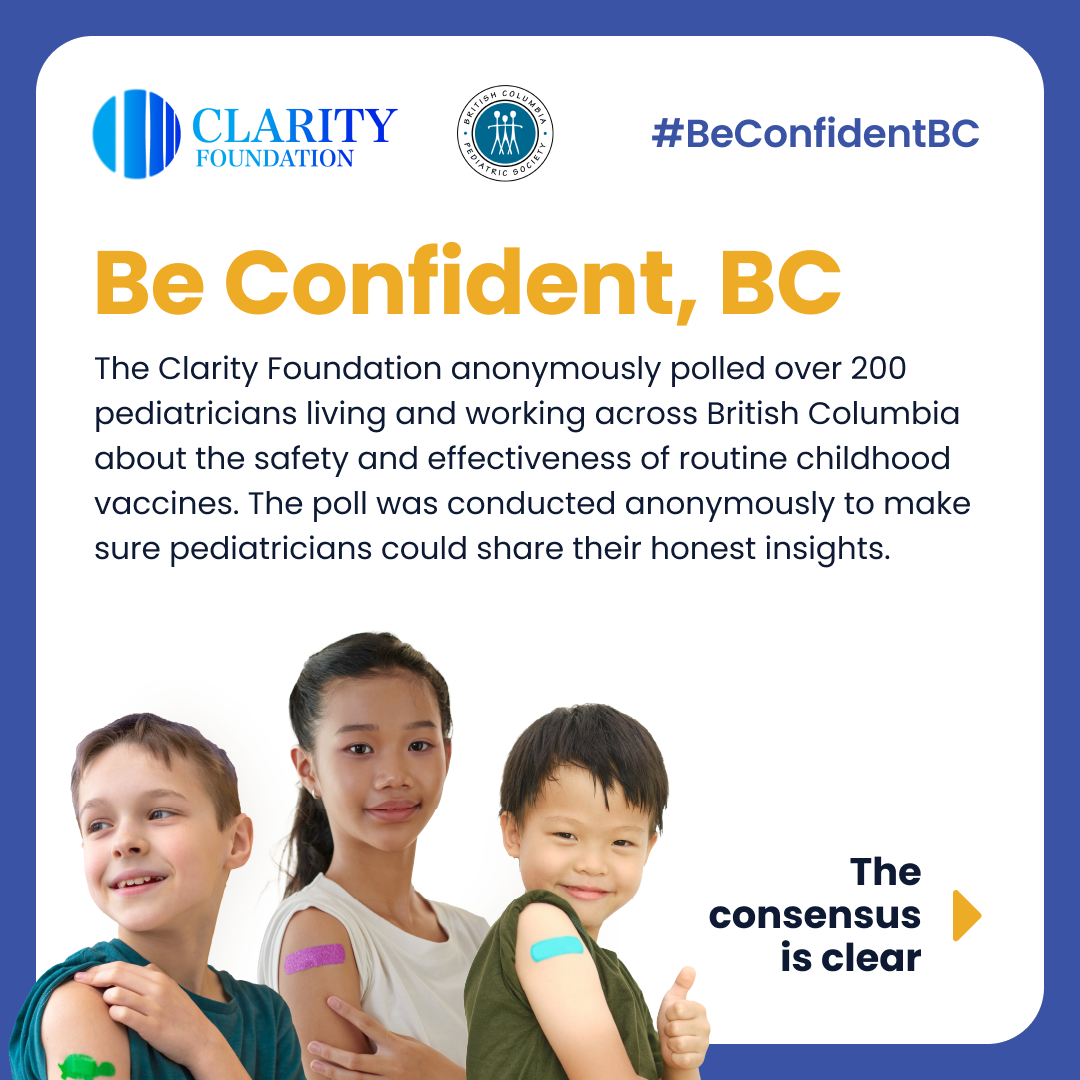Be Confident, BC, about your child’s health and safety
British Columbia pediatricians agree: Routine childhood vaccines are effective and safe.
You want to make the best decision to protect your kids–and your community. Childhood illnesses don’t just affect kids: they ripple through families, schools, and workplaces. These childhood illnesses are deadly in some cases and highly disruptive in many others. Vaccines protect against diseases that cause children to miss school for extended periods, force parents and caregivers to miss work to care for sick kids, burden households with unexpected healthcare costs, and—in the worst cases— present life threatening challenges to patients and communities.
We think vaccines are worth it to minimize these risks.
Still, there’s a lot of information out there about vaccines. A lot. It can get confusing.
To make things clearer, the Clarity Foundation anonymously polled members of the British Columbia Pediatrics Society to understand their views on routine childhood immunization. This poll is not simply to ‘count opinions’ but to reflect the strength of the underlying science.
Read on to understand who we are and what we did. Then have a conversation with your physicians about what is best to keep your kids healthy and safe.
Join the Conversation
Join the conversation on social media with the hashtag #BeConfidentBC. We invite you to like, comment, and share our posts, and to make posts of your own using the content in our social media toolkit.
“As pediatricians, our primary goal is to safeguard the health of children in British Columbia. The consensus amongst us about vaccinations underscores their importance for your child's health. Let's talk about how we can work together to be confident and protect your family."
- BC parent and pediatrician, Dr. Alastair McAlpine
Poll Results
Of the 211 pediatricians anonymously surveyed about the routine immunization schedule approved for safety and effectiveness by Health Canada and then adopted into the schedule by the BC Centre for Disease Control…
100%
say childhood vaccines are effective and safe.
99.5%
advise their own family and friends to follow the Canadian recommended vaccine schedule for children.
100%
note the benefits of vaccinations far exceed the potential complications.
98%
emphasize that although healthy eating and handwashing are valuable, they cannot substitute for vaccines in keeping children safe.
Prepare for your conversation using our chatbot.
Make an informed vaccine choice with confidence. Have an open conversation with your physician—they're ready to help!
Prepare for your visit by listing your questions in advance. Our chatbot tool can assist, offering answers with patience and respect.
FAQs about the poll and routine vaccinations
-
To get the best information about routine childhood immunization, we partnered with the independent British Columbia Pediatric Society, whose members strive for optimal physical and mental health for all children and youth in British Columbia. We partnered with BCPS, emailing their 480 members with our secure poll. Our results reflect the full set of responses we received from 211 members.
-
We asked pediatricians to rate their agreement with six key statements:
I am confident that routine childhood vaccines are safe.
Routine childhood vaccinations are effective at reducing the incidence of vaccine-preventable diseases in the community.
The benefits of routine childhood vaccinations far exceed any risks from the potential complications.
Strategies exist, such as eating healthy goods and washing hands, that eliminate the need for childhood vaccinations.
The Canadian routine childhood vaccine schedule results in too many vaccinations given simultaneously to children who are too young.
I recommend to my friends and family to follow the Canadian childhood vaccine schedule without delay.
-
We polled pediatricians using new technology, powered by SciPinion, to ensure that responses are secure and anonymous. This means that each pediatrician answered in a way that honestly reflects their view of the underlying science, without considering what others might think.
-
Vaccines in the routine immunization schedule have been approved for safety and effectiveness by Health Canada and then adopted into the schedule by the BC Centre for Disease Control.
Diphtheria, Tetanus, and Pertussis (DTaP/Tdap)
Haemophilus influenzae type b (Hib)
Hepatitis A (HepA)
Hepatitis B (HepB)
Influenza (Flu): Annually, starting at 6 months of age
Meningococcal vaccines (MenACWY, MenB)
Polio (IPV)
Pneumococcal conjugate vaccine (PCV)
Measles, Mumps, Rubella (MMR)
Rotavirus (RV)
Varicella (Chickenpox)
View the full BC immunization schedule at ImmunizeBC.
-
Together, Health Canada, the National Advisory Committee on Immunization (NACI), and the BC Centre for Disease Control (BCCDC) ensure vaccines are effective, are safe, and are worth it.
Health Canada: the federal authority that evaluates the safety, efficacy, and quality of vaccines based on clinical trial data and manufacturing processes. Only vaccines that meet their high standards are approved for use in Canada.
National Advisory Committee on Immunization: NACI is a nonpartisan group of experts in Canada who provide evidence-based recommendations for the use of vaccines. Based on reviewing clinical trial data, epidemiological evidence, and expert input, NACI advises Health Canada on which of the approved vaccines should be included in the routine immunization schedule.
BC Centre for Disease Control: BCCDC adapts the NACI’s recommendations to suit provincial needs and priorities, including adjustments to the timing or additional vaccines.
-
To make a confident vaccine choice that is right for you and your kids, it’s best to have an open, honest conversation with your physician. Your physician is ready and willing to talk to you! To be ready, consider preparing a list of your questions and concerns in advance.
Once you feel confident about vaccinations, make sure your kid is ready to have a positive experience, including bringing a comfort item!
Clinicians:
Elevate your clinical conversation using our materials.
Our materials indicate that physicians and other health workers are ‘ready and willing’ to talk with parents about vaccines—so be ready! Display the materials in consultation rooms and incorporate them into your conversations from arrival to check-out. Consider the proven AIMS methodology to guide your empathetic conversations:
Announce: State that it is time for the vaccination in a friendly, calm, non-paternalistic, matter-of-fact professional manner. Start as early as check-in and echo throughout each clinical touchpoint.
Inquire: If the parent/caregiver shows any hesitation, ask open-ended ‘what?’ and ‘how?’ questions to understand caregivers' concerns (rather than ‘why?’ questions).
Mirror: Reflect their perspectives to build trust, showing you have been listening.
Secure: Provide tailored information to strengthen their confidence. You can point to our materials to show that you are not alone in the guidance you are providing! You may not get to ‘yes’ in a single visit—and that’s ok. Build trust first.
How the Clarity Foundation works
The Clarity Foundation is an independent, nonpartisan Canadian charity. You can learn more about our team here, but our work at the Clarity Foundation is not about our teams’ beliefs and opinions. Instead, to get the best information, we poll experts to understand where the balance of opinion lies.





